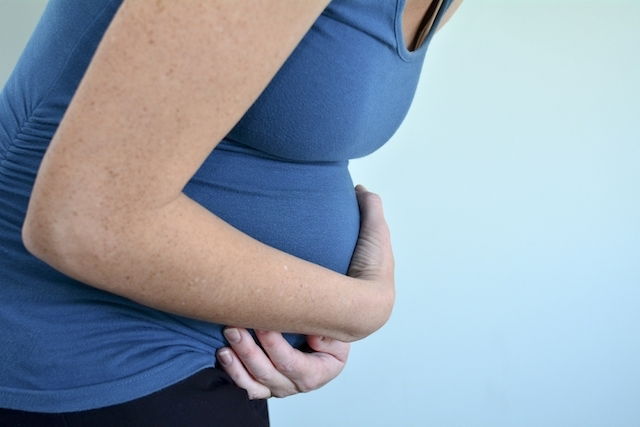Rib pain during pregnancy is a very common symptoms that generally appears after the 2nd trimester. It is usually caused by inflammation of the nerves in this region, which can cause additional symptoms like muscle spasms and skin tingling .
Rib pain during pregnancy is also referred to as intercostal neuralgia. It can occur as a consequence of hormonal changes that happen with pregnancy, enlargement of the uterus, inadequate posture or infections that cause inflammation or compression in the nerves in the area.
Frequent rib pain during pregnancy should be assessed by a doctor to determine the underlying cause. This will help to direct the most appropriate treatment approach. Self-medication is not recommended, as completing treatment not advised by your doctor can be harmful to the woman or the baby.

Common causes
Rib pain during pregnancy often happens due to hormonal changes that occur pregnancy. These changes can lead to fluid accumulation and swelling in the body, which can compress the nerve. Furthermore, as the uterus become larger, the diaphragm also starts to sit higher in the chest, reducing chest volume when breathing and the space between ribs. This can further compress the nerves found in these spaces, causing intense pain.
Rib pain can also be caused by poor posture, low vitamin B levels or viral infections. Therefore, you are advised to consult an obstetrician to identify the correct problem and begin appropriate treatment.
Main symptoms
Symptoms that can appear with rib pain during pregnancy include:
- Pain that is intense and located in the rib or chest region
- Pain that radiates to the area below the ribs, shoulders or stomach
- Pain that persists even when resting
- Pain that worsens with sudden movements, such as turning the body or lifting objects.
Some women may also experience frequent sweating, muscle spasms, fever and skin tingling. Because of these symptoms, women may confuse rib pain with heart problems, which can be stressful.
Therefore, you are advised to consult your OB if you frequently experience rib pain. The doctor may order testing to identify the underlying cause and direct treatment.
How to relieve pain
During pregnancy, the use of anti-inflammatories and analgesics without medical advice is completely contraindicated, as they can harm the baby's development. Therefore, to relieve rib pain, you are advised to rest whenever possible. Ideally, you should lie on a hard surface, such as a table or rigid mattress, as this prevents excessive rib movement.
Using a brace during pregnancy also helps to relieve pressure on the ribs and, therefore, can be used as directed by your OB.
You can also apply hot compresses to the ribs to help the muscles relax and prevent them from applying excessive pressure on the intercostal nerves. Alternative therapies, such as yoga or acupuncture, can be used during pregnancy and may relieve discomfort experienced during pregnancy.
If the rib pain is from a specific case, such as a vitamin deficiency or a viral infections, the OB will prescribe medications as necessary.






























